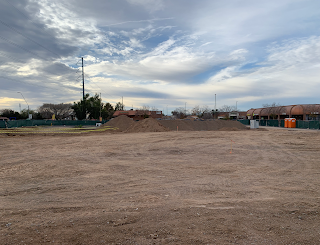The point of view of the bad guys in old Westerns
Like most kids my age (I'm in my sixties now), I grew up watching a lot of old Westerns. They all seem to kinda blur together in my mind, and of course there was always a hero, and you couldn't have a hero without bad guys. And of course I accepted the bad guys as presented, they usually wore black hats, maybe had long moustaches that curled up at the edges, that sort of thing. But as I got older, I started to wonder about these people.
One of my most vivid memories is of Clint Eastwood letting out a deep sigh as he looks some men who decided to confront him in an old Western movie, and he says, "Everywhere I go, people like you..." Of course, if they had known that they were in a movie, and his name was in the starring role, they would have never messed with him, but, well, there's gotta be bad guys in order for there to be conflict. And you can't have drama without conflict.
I've lived in Arizona for most of my adult life, and I often feel like letting out a deep sigh, because everywhere I go, I see people who act as if they were cast as bad guys in an old Western. And while it's very easy to see through the point of view of the hero, I've often tried to see through the point of view of the bad guys.
The closest that I can come to understanding bad guys is that everything they're doing seems to make perfect sense to them. They may see the world as oppressive, and as they do stuff like steal horses, or hold up the stagecoach, they're just getting a little bit of their own back. Of course there are always completely psychotic people who do anti-social stuff just because of some type of mental health issue, but the vast majority of bad guys aren't like that. They're standing up for what they think is right - thinking of themselves as Robin Hood, and the "giving to the poor" part just means keeping the loot.
A typical old Western hero may be riding into town to clean up the place, but the people that he's going to clean up may feel that they don't really need it. And that's why it's so dramatic, and can be so violent. The hero doesn't just say, "Maybe you should stop stealing horses and robbing the stagecoach", to which the bad guys say, "Yeah, I guess you're right - we're not being very nice, maybe we'll go take up gardening instead", they fight.
In the old Westerns, the story always ends as the bad guys are being hauled away to the hoosegow. Or, if there's a sequel, the hero is called back again because it starts all over again, and again, and again (depending on how many sequels are made). And people like me are left to wonder about point of view.
If you like pictures of old-time Phoenix, please become a member of History Adventuring on Patreon. I share a LOT of cool old photos there, copyright-free, with no advertising. If you like Phoenix history and would like to help support my efforts to preserve and share precious digital historic images, please consider becoming a patron. Thank you!
Become a Patron!




Comments
Post a Comment